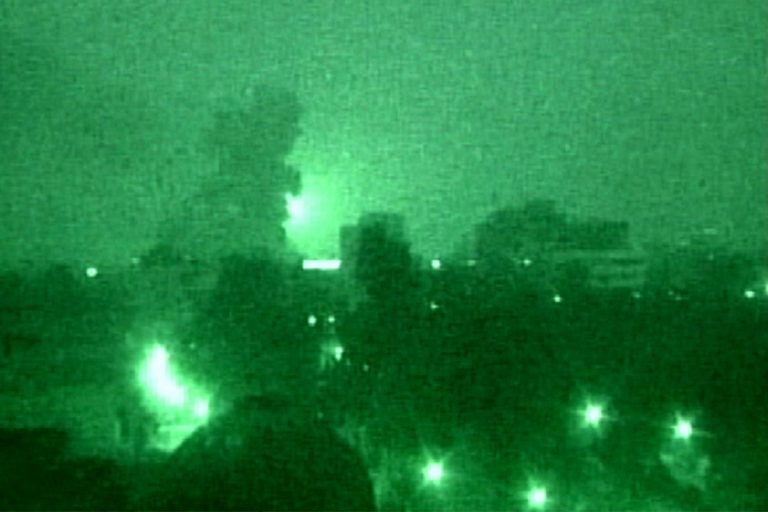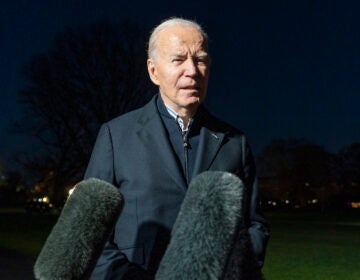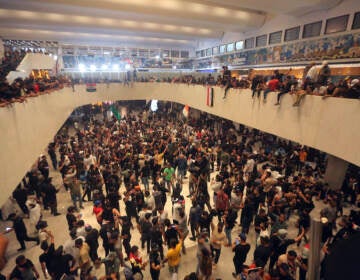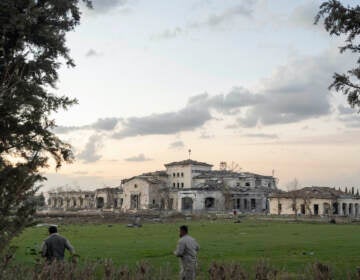With murmurs of war growing, 2018 could be a national security election
The Iraq War’s disastrous aftermath offered my younger self a harsh lesson: Our great and generous nation can be ruled — and also diminished — by mediocre men.

In this image from television via a nightscope, a cloud of smoke rises, at left, following a U.S.-led air strike attack on a target Thursday morning, March 20, 2003, near Baghdad. (AP Photo/APTN)
Just over 15 years ago, in March 2003, I sat as a Peace Corps volunteer in a tiny restaurant off a dusty street in a small Chinese industrial city to watch the first moments of the second U.S. war in Iraq unfold on television. Air raid sirens wailed through the Baghdad night. As the thunder of American bombs arrived, scattered plumes of flame illuminated the inky landscape. In 2004, after I’d returned home, George W. Bush would be re-elected president in a contest dominated by questions of national security. We have not had such an election since. That’s about to change.
With John Bolton taking the reins as White House National Security Advisor early this week, our country stands at the precipice of yet more needless, ruinous war. We have an unprincipled president who traffics in the art of spectacular distraction and has now surrounded himself with insecure men who possess the relish for armed conflict seen mostly in those who have never endured it. Both of these factors make another foreign war far more likely.
Bolton, in fact, was one of the chief hawks behind Bush’s failed foreign policy. Bolton’s return to power is alarming, and it necessitates that we put foreign policy at the center of the next election.
This time, I’m a candidate, for the 5th Congressional District in Pennsylvania. It’s a far cry from my days teaching English to students from Chinese farming families. Yet I feel a similar, sickening sense of helpless inevitability as I listen to the drumbeat of war grow ever louder. And now I know precisely how damaging needless conflict can be to our power and prestige abroad.
In the wake of the American invasion of Iraq, I was frequently asked in China how I could defend the choice to go to war in Iraq. I couldn’t, although I took pains to emphasize my love of my country, adding that I thought Saddam Hussein as a bad actor.
The war’s disastrous aftermath offered my younger self a harsh lesson: Our great and generous nation can be ruled — and also diminished — by mediocre men.
Even in that fraught time, serving abroad made me feel more American than ever. Our ability to speak freely, our fundamental optimism, our eagerness to serve, our distinct notion of American-ness untethered from race, class, or caste — I saw for the first time that what made me normal at home made me unique elsewhere.
But representing my country also showed me how much responsibility attends the statement “I am an American.” No nation is more closely scrutinized or held to a higher standard. Those ready to impute the worst motives to our actions abroad are always searching for evidence. Sometimes, we give it to them.
We are long past 2003, in the aftermath of the worst attack on U.S. soil from a foreign power since Pearl Harbor. Yet, because of a combination of Russian meddling, a president’s Freudian vendettas, and a foreign policy establishment unable to shed notable, repeated failures like Bolton, another crisis of historical proportions is brewing. This May will be crucial in how we handle two huge threats: North Korea and Iran. May 12 marks the lapse of a 120-day period during which Trump pledged to consider alternatives to the Iran deal, which he views as inadequate. That same month, the president is slated to meet directly with North Korean dictator Kim Jong-Un.
In both cases, Bolton is eager to turn matters in a more bellicose direction. He has loudly and repeatedly proclaimed a desire to attack both Iran and North Korea. Never mind that Bolton himself has been instrumental in worsening the situation with both, first by cheerleading a ruinous Iraq War that further destabilized the Middle East, then abandoning an agreement that provided a pathway for a denuclearized North Korea. The regimes in Tehran and Pyongyang are no good, but we have options beyond direct conflict and the unimaginable costs those could impose.
Trump, Bolton, and even progressive opponents often describe violent foreign policy as “tough.” That’s hardly the concept of American strength I learned in the Peace Corps. Those serving abroad quickly learn that our power lies in servant leadership: the humble ideal that our good works make us exemplars, which in turn grant us earned influence. The long, irresistible strength of persuasion ultimately trumps fleeting shows of force. And service members on our front lines know too well the terrible costs of conflict.
That’s why this upcoming election will likely be the first foreign policy election in many years. Normally, our relationships with foreign nations lack the visible impact on daily life and safety that motivates voters. But that equation reverses in times of crisis, when developments in distant capitals can come quickly thundering home.
The 2018 midterm election will take place during such a moment. It will not only mark the first occasion to issue a collective rebuke to a bellicose foreign policy that threatens conflicts in two sensitive regions. It will also mark our last — and best — chance to check what could become a catastrophic, self-immolating series of military adventures. We can still turn the tide and avoid a tragicomic repeat of historical blunders whose scars are still raw. But the odds grow longer each day.
—
David Wertime is a research scholar at the University of Pennsylvania’s Center for the Study of Contemporary China and a senior fellow at the Foreign Policy Research Institute in Philadelphia. He is a Democratic candidate to represent Pennsylvania’s 5th Congressional District. He lives in Merion Station.
WHYY is your source for fact-based, in-depth journalism and information. As a nonprofit organization, we rely on financial support from readers like you. Please give today.




